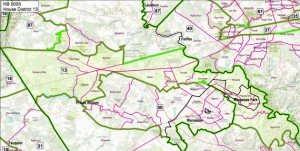
Local politicians remain divided in response to redrawing Virginia Senate Districts with Republicans saying it will bringing government closer to the people, and Democrats saying it will inequitable to ethnic minorities.
Virginia State Senator Richard Black of the 13th District, which includes western suburban Prince William and Loudoun counties, defended the decision to redraw districts.
In a written statement provided to Bristow Beat, Sen. Black said the decision to redraw districts would keep districts more compact and reflect the counties where the constituents lived.
“The boundaries adopted in 2011 fell far short of Virginia’s traditional redistricting criteria. Districts are supposed to compact, but those approved were sprawling and meandering. Districts are supposed to combine communities with similar interests, but those approved did the opposite, gratuitously splitting counties, cities, towns and individual precincts using partisan voting histories as the primary guideline. Districts are supposed to have populations that are reasonably equal to ensure the principle of one-person-one-vote, but those approved were wildly disparate in population.”
Wally Covington, Board of County Supervisor for the Brentsville Magisterial District, agreed with Black on that issue.In a phone interview with Bristow Beat, Covington said redrawing districts would facilitate easy communication between district representatives and their constituents via town hall meetings. It would also provide incentive for state senators to listen to the opinions of those in county government, who tend to be closer to and more responsive to the people in their communities.
However, there has been controversy surrounding the General Assembly Senate vote taken on Jan. 21. While one Democratic Senator was absent from Senate to attend the President Obama’s Second Inauguration, the Republicans held the redistricting vote, which passed 20-19 along party lines.
In addition, Democrats have called into question the equity in the new boundaries being proposed, especially in regards to minority voters. However, Republicans say it actually increased the number of minority-majority districts from five to six, and thus would not be in opposition to the Voting Rights Act.
Black said that the number of minority-majority districts have remained steady for the last 22 years, even as African American populations have risen to the point where population is sufficient to create a sixth district.
“The new plan corrects this deficiency and creates the sixth African-American majority-minority Senate district,” wrote Black, “By doing so, the plan inoculates Virginia from potentially costly and unnecessary litigation under the provisions of the Voting Rights Act.”
However, Democrats across the state have argued that the creation of sixth district will not help the minority vote, but dilute it by dividing those voters amongst more districts.
Harry Wiggins, Chair of the Prince William County Democratic Committee, said that the plan would be more detrimental to people of ethnic minorities.
“This is another plan by the Republican Party of Virginia to place minority voters in racially segregated Senate districts, diluting the voting strength of minorities across the commonwealth. The Republican members of the House of Delegates and the Senate are attempting to preserve their ever shrinking voter base, knowing that the more people that vote in the electoral process the fewer Republicans will be elected,” Wiggins said.
Wiggins believes citizens need to remain vigilant to protect against gerrymandering that would provide Republicans with an unfair advantage. While, Virginia was a clearly red state ten years ago, populations and voting behaviors have evolved, making Virginia a swing state.
“This past election, in Prince William County, every Democrat with the exception of Cristin Kabral won in the county: President Obama, Senator Kaine, Representative Connolly, Adam Cook and School Board member Lillie Jessie*,” Wiggins said.
He further took a stand that Republican elected officials were trying to suppress voter turnout to ensure their party remains in power.
“Sen. Black along with his extremists in the House of Delegates, Del. Miller, Marshall, Anderson and Lingamfelter, will do anything to minimize voter turnout and to ensure that the voters are no longer are a factor in Virginia elections, even to pass clearly unconstitutional redistricting legislation,” Wiggins said.
But despite criticism, Republicans say they only want to increase the responsiveness of government and bring power back to the people within their counties and municipalities.
Republicans admit the process is imperfect, but deny that it is inequitable to any particular voting group.
“When an entirely new district is created, all of the others have to change. And while no plan for drawing borders for districts is perfect, the new one corrects all the deficiencies of the current map. The districts are significantly more compact, split fewer localities, keep similar communities in the same district wherever possible, and are closer in population. The result is better map that fully complies with the Voting Rights Act,” Black wrote.
Even if the law passes muster with the Voting Rights Act, it may be challenged, since states are only suppose to redistrict every ten years after a census. However, Republicans say the redistricting would redress districts that were badly drawn in 2011.
* Strictly speaking, School Board representatives do not campaign along party affiliations, and publically claim not party affiliation.
Support Bristow Beat - Donate Today!